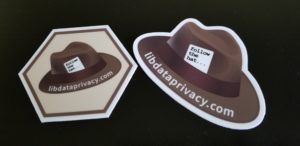Welcome to this week’s Tip of the Hat! Are you prepared for ALA Midwinter in Philadelphia this week? If not, you’re not alone. LDH is ready to help you get the most out of #alamw20!
Before You Go
Here are some reminders as to how to protect your privacy while traveling and conferencing:
VPN? Check. AC wall charger or power bank for the phone? Check. Mental reminder to take off the conference badge outside of conference spaces? Check!
In the Exhibit Hall
Booth #1823 – Stop by and get a sneak peak of the upcoming Privacy Field Guides! These guides cover a variety of topics, including privacy audits and the data lifecycle.
Booth #864 – The Library Freedom Project will be answering any questions about the Institute (applications due February 10th) as well as handing out resources about protecting privacy at your library and community.
In the Schedule
Sunday, January 26th seems to be the day for privacy at Midwinter:
Intellectual Freedom Committee (IFC) Privacy Subcommittee Meeting; 8:30 AM – 10:00 AM; Room 111-A
Learn more about the current projects going on in the Privacy Subcommittee! You don’t have to be a member to attend the meeting.
Data and Diversity: Navigating the Ethics of Demographic Data in Inclusive Community Collections; 1:00 PM – 2:00 PM; Room 203-AB
Abstract: Librarians building local collections want to represent the diversity of their communities. When we use information about people’s identities to assess a collection’s inclusivity, how do we protect people’s privacy and respect their autonomy? We’ll discuss how we addressed these questions for local digital music collections at public libraries in Seattle and beyond.
We’ll share best practices we created, how we developed those practices, and how we continue to adapt them. We present our work with community data as a template for engaging with the complex and evolving issues facing librarians in an era of rapid technological and societal change.
LITA Top Tech Trends; 1:00 PM – 2:00 PM; Room 122-A
LITA’s Top Tech Trends is always a popular event, and privacy and security will most likely make their way into the panel discussion.
Data Abuse: Is There a Sustainable Solution to Help Notify Users of Egregious Data Abuses?; 4:00 PM – 5:00 PM; Room 204-C
Abstract: How can patrons easily understand the extent of data collection that results from their use of electronic resources? Often, the resource provider just wants to confirm a patron’s institutional affiliation, but some vendors require that users create an account, subscribe to a newsletter, or provide demographic information. At Cornell University Library, staff are exploring options for helping patrons easily understand data collection from electronic resources – a system that can be supported, shared, and used by all. In this discussion, we will explore our ideas so far, and seek input on how to make such a service sustainable.
LDH will not be at Midwinter this year, but we plan to be at Annual in Chicago. We hope to catch you then! In the meantime, safe travels to Philly, and enjoy all the privacy offerings Midwinter has to offer.





